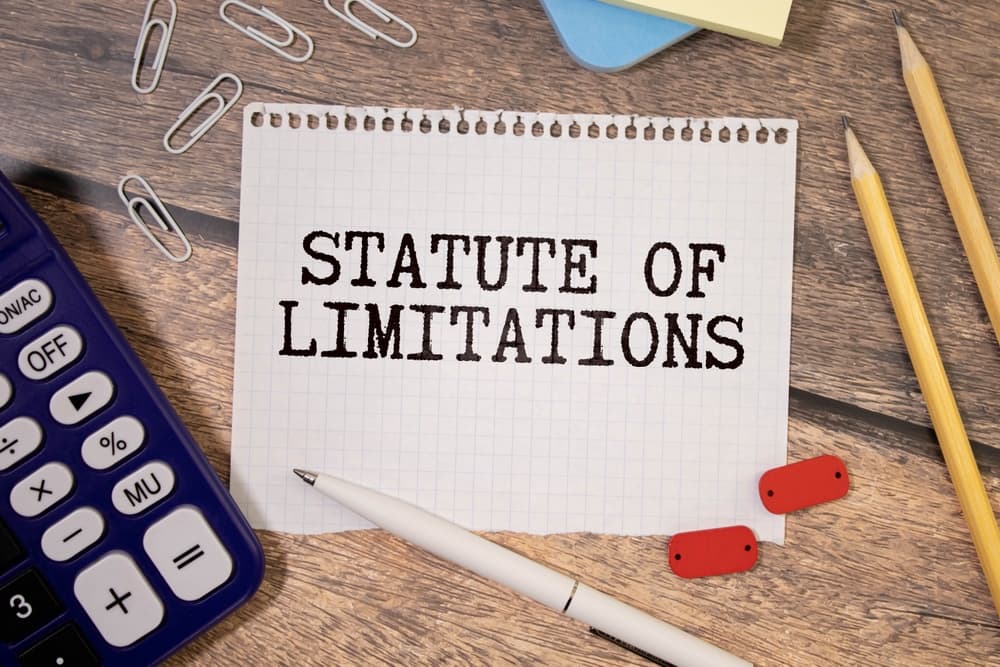How Long Do I Have to File a Lawsuit After a Drunk Driving Crash? This is a common question for those trying to recover after a traumatic experience. If you're in Phoenix, Arizona, or elsewhere in the state, understanding the timeframe to pursue legal action is essential. Speaking with a drunk driving accident lawyer can help you understand your rights and ensure you act within the legal deadline.
Filing a lawsuit within the allowed period can be the difference between seeking justice and losing your chance for compensation.
Arizona's Deadline for Filing a Lawsuit After a Drunk Driving Crash
Arizona has a statute of limitations that sets the maximum amount of time you have to file a lawsuit. For a drunk driving crash, which falls under personal injury law, the deadline is generally two years from the date of the incident.
If you wait beyond this timeline, the court will likely dismiss your case, which means you cannot hold the drunk driver legally accountable for your injuries.
The timeframe may differ in some situations, but these cases are rare and often involve unique legal circumstances.
To avoid confusion, start taking steps as early as possible after the crash.
Why Does Arizona Have a Statute of Limitations?
A statute of limitations helps streamline the legal process and ensure that evidence, like witness accounts and physical documentation, remains reliable. Waiting too long to file can weaken your case because key details might fade.
For drunk driving crash lawsuits in Phoenix, starting the process well before the two-year deadline is especially crucial. Delaying your claim could mean losing access to critical records or witnesses who might support your case.
Extending or tolling the statute of limitations

Although the two-year limit applies in most cases, certain exceptions could extend or "toll" the statute of limitations:
Discovery of injuries: If your injuries were not immediately apparent after the crash, the clock might start ticking when you discover or reasonably should have discovered the injuries.
For example, internal injuries or traumatic brain injuries might only become evident weeks or months later.
Cases involving minors: If the injured party is under 18, the statute of limitations generally begins upon reaching adulthood.
Wrongful death claims: If a loved one was killed in a drunk driving crash, the clock typically starts on the date of death, not the date of the crash itself.
Since these scenarios are less common, don't assume they apply to your case without consulting a lawyer.
Steps to Take in the Weeks After a Drunk Driving Crash
Surviving a drunk driving crash is a traumatic experience. While the immediate focus is on physical recovery, taking certain actions in the days and weeks after the incident can strengthen your potential legal claim.
These steps can help your case:
1. Document injuries and treatment
Keep a detailed record of your medical treatment and recovery. Save medical bills, prescribed medications, and physical therapy records.
Taking progress photos of visible injuries can also be helpful. This documentation will serve as direct evidence of how the crash affected you.
2. Keep communication records
Save any correspondence with your insurance company or the drunk driver’s insurer. Do not agree to a settlement without understanding its full implications. Keep records of any phone calls, emails, or letters.
3. Move quickly to obtain the accident report
If the police were called to the scene, request a copy of the crash report as soon as it is available. The report often indicates whether the driver was under the influence, which is a key element in your case.
4. Avoid public statements about the crash
Refrain from posting on social media. Anything you say publicly could potentially harm your case. Defense attorneys often search for online posts to undermine claims in personal injury lawsuits.
5. Consult with professionals
If you seek compensation for your injuries, speak with an attorney early. They can explain your legal options and inform you about your deadlines.
Types of Damages You Can Recover After a Drunk Driving Crash
Filing a lawsuit is not just about seeking accountability; it’s also about recovering damages for the physical, emotional, and financial toll the crash has taken. Arizona law allows victims to pursue several types of compensation:
1. Economic damages
These include measurable costs like medical bills, vehicle repairs, and lost wages. If you are unable to work due to your injuries, you can also seek damages for reduced future earnings.
2. Non-economic damages
Non-economic damages cover the intangible effects of the crash, like pain and suffering, emotional distress, and loss of enjoyment of life. While these damages are harder to calculate, they are often a substantial portion of the compensation sought in drunk driving crash cases.
3. Punitive damages
Unlike economic and non-economic damages, punitive damages are not aimed at compensating the victim. Instead, they are intended to punish the drunk driver for their reckless behavior. Arizona law allows for punitive damages in cases of willful misconduct, such as driving under the influence.
Uninsured and Underinsured Drivers in Arizona
Unfortunately, not all drunk drivers carry sufficient insurance (or any insurance at all). This can complicate the process of getting the compensation you deserve. Arizona requires drivers to carry a minimum amount of liability insurance, but these limits may not cover the full extent of your injuries.
If the drunk driver has limited or no insurance, you may need to rely on your own uninsured or underinsured motorist coverage. These types of policies can fill the gap between the at-fault driver’s coverage and your actual expenses.
The Legal Process in a Drunk Driving Crash Lawsuit
If you decide to file a lawsuit, understanding the major stages of the legal process can help you prepare:
Filing the Complaint: Your lawyer will file a formal complaint that lays out the facts of your case and the compensation you are seeking.
Discovery Phase: This is the period when both sides gather evidence. It often includes depositions, interrogatories, and the exchange of documents.
Potential Settlement: Many cases resolve through settlement negotiations. Settling allows you to avoid the uncertainty and time commitment of a trial.
Trial: If no settlement is reached, your case may go to trial, where a judge or jury will determine the outcome.
Remember, filing early gives your legal team the time they need to build a strong case.
What Happens if You Miss Arizona’s Deadline?
Failing to file a lawsuit within the two-year timeframe can have severe consequences. The court will almost always refuse to hear the case, meaning you forfeit any chance of receiving compensation.
Some exceptions exist, but they are uncommon. Acting promptly is always your best course of action.
Why You Shouldn't Wait to Speak With a Lawyer
Even if you believe you have plenty of time before the statute of limitations expires, it is in your best interest to act quickly. Building a strong drunk driving crash case involves gathering evidence, interviewing witnesses, and often dealing with uncooperative insurance companies. Waiting too long increases the risk that critical evidence or witnesses will no longer be available.
Additionally, early legal action can help preserve evidence such as surveillance footage or records from alcohol-testing devices. Both types of evidence can be vital in proving the driver was intoxicated.
Time matters after a drunk driving crash, especially when it comes to pursuing legal action. The statute of limitations in Arizona sets a firm two-year deadline for filing a lawsuit in personal injury cases. Missing this deadline can close the door to any legal remedies, so acting sooner rather than later is essential.
What Happens if the Drunk Driver Faces Criminal Charges?
If the drunk driver responsible for your crash faces criminal charges, you may wonder how that impacts your personal injury lawsuit. It’s important to know that criminal charges and civil lawsuits are entirely separate processes.
Each serves a different purpose, operates under different rules, and results in different outcomes. The government handles a criminal case against the drunk driver and focuses on punishing them for breaking the law. Penalties in these cases can include fines, jail time, or license suspension.
On the other hand, a civil case is brought by you, the injured party, and focuses on obtaining financial compensation for your injuries and losses. Even if the drunk driver is found guilty in criminal court, you still need to file a civil lawsuit to seek damages.
Do you need a conviction to file a civil claim?
No, a criminal conviction is not required to file or win your personal injury lawsuit. Civil cases operate under a lower standard of proof than criminal ones.
While a criminal case requires proof “beyond a reasonable doubt,” a civil case only requires proof “by a preponderance of the evidence.” This means that in civil court, it’s enough to show that it’s more likely than not that the driver’s intoxication caused the crash.
Even if the drunk driver avoids a criminal conviction, you can still pursue a strong case against them.
How criminal proceedings may help your civil case
Although a criminal conviction isn’t required, it can strengthen your civil case. If the driver is found guilty of driving under the influence (DUI), this serves as strong evidence of negligence.
Civil courts may allow evidence from criminal proceedings, such as guilty pleas, toxicology reports, or alcohol-related field test results, to be presented in your lawsuit. This information can help establish fault and make it harder for the defendant to dispute your claims.
However, even if the criminal case is still ongoing, your civil case does not have to wait for it to conclude. While having a DUI conviction on record can boost your suit, your legal team can gather evidence independently, such as police reports, eyewitness accounts, or crash scene data, to support your claims.
Coordinating a civil lawsuit with criminal charges

If the driver faces criminal charges, it’s essential to coordinate your civil lawsuit without unnecessarily delaying either case. Legal deadlines, such as Arizona's two-year statute of limitations for personal injury claims, do not pause during criminal proceedings.
While the criminal case may highlight the driver’s actions leading up to the crash, your civil lawsuit ensures you can pursue the compensation you deserve. Ultimately, the criminal process's outcome does not dictate your civil case's success. It provides one piece of the larger picture as you seek accountability for what you’ve suffered.
At Kurtz Riley Law Group, our goal is to help injured individuals feel supported throughout the legal process. If you or a loved one has been injured in a drunk driving crash in Phoenix or the surrounding areas, reach out to us at (623) 303-5754. Swift action can make all the difference in seeking justice and securing the compensation you deserve.